|
The
first attempt to put boxing on its feet in Ballina was made by a
Richard Forde of Ardnaree, elder brother of Pappy the postman. Richard,
better known to his friends as "Bug", was a sturdy, stocky fellow who
did quite a stint of boxing in the British Army, and, according to his
comrades-in-arms, was a very useful performer. On his return to civic
life and his native Ardnaree, he penned a letter to the press to the
effect that there should be a gym and boxing club in the town and he
was willing to train and instruct the boxers. Furthermore, he would box
anyone his weight in Ireland, at any time, in any tournament.
Unfortunately, nothing came from his offer, much to his disappointment.
Peace to his ashes.
The
first boxing tournament on record for Ballina took place in St.
Muredach's College Ground in 1923 and this was run in conjunction with
Moyalla Bazaar. It was more or less a number of exhibitions. The
principal performer was Jim Coffey of Castlerea, an ex U.S.A
professional,
who, in his best days, went six rounds with the great Jack Johnson. The
only local performer we had of note was Charlie McLoughlin, a Derry
plumber. Poor Charlie, who was in his 40's, bit the dust to the younger
Mick O'Grady, Westport. The above tournament did not makeany impression
on the youth, nor did it encourage anyone to start a boxing club. |
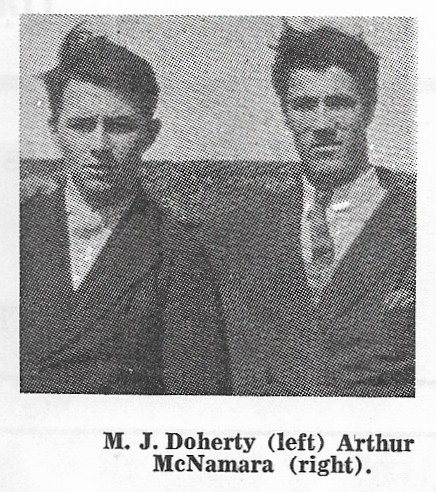 |
Fortunately, it was followed soon afterwards by a first-class tournament run by the Army in which some top-of-the-bill boxers took part. They were Corp. Paddy Hennelly, then Army welter champ; W. O'Shea, Army lightweight champ; M. McDonagh, Army bantam champ (afterwards Canadian champion); Willie Wright, Irish light champ (Phoenix Club); Thomas Hickey, finalist light Irish champion.
Paddy Hennelly, who who later joined the Gardaí, won the Tailteann Games middle-weight title and is now a Garda sergeant, was also a great international boxer. Willie O'Shea was described as one of the best amateur light-weight boxers in the world by the American press. The admission fee for this first-class tournament was very modest -- one shilling (12 old pence) up in the balcony in the old Town Hall. Although a shilling was hard to come by in those days, most of us scraped it together for a packed-tight balcony. It was a tournament which whetted our appetite for the game.
THE FORMATION OF THE FIRST BALLINA CLUB
The Corcoran brothers, John Street, Jim and Jack, ran a good hackney service and they had rented for a garage the big shed at the back of the old Estoria Cinema. Jack had a keen interest in boxing and had a set of boxing gloves. In this shed or garage with lamp and candle-light (no E.S.B. at the time), the Garry brothers, Jack and Larry and E. Moran did their bit of sparring; they were soon joined by others, but the thing was getting too big and something had to be done. So after a discussion it was decided to to ask teh late James Ahearn, who owned the Town Hall and ran a silent cinema at the time (1926) if he would rent the supper room, which was a very spacious room and ideal for the purpose. This was agreed to for 5/- per week, which included free electric light which was generated on his own plant. So was born teh first Ballina Boxing Club; its sole assets were two sets of boxing gloves. A committe was formed which included the late Sid Ruddy and Paddy Molloy (peace to their ashes) also W. J. Loftus (victualler, Bridge St.), Jack Garry, Jack Corcoran, V. Leonard, J. Lynch and Mick Durcan M.P.S.I. The membership was fixed at 6d per week. The first question was the raising of funds and it was decided to run a Whist drive and dance in the Hibernian Hall. Tickets were printed and sold at 2/6 for Whist adn Dance, and to the credit of people of the town I don't think anybody refused to buy one. The result was a great success and left a profit of over £50 -- a fair sum of moned in 1926. This equipped our gym with punch-balls, sand-bags, singlets, trunks etc. We also purchased a horizontal bar and a vaulting horse from the Rectory, Arsnaree. The late Mick Naughton, carpenter, built for us a ring so in a very short time we had a first-class gymnasium and our membership rose to over 50 members.
To gain access to the supper room in the old Town Hall we had to pass through a dressing room at the stage. This room was rented by the British Legion: to their credit they raised no objections but some of their members used to come and have a look at our efforts: Jock Shaw, A Scotsman; Jack Birrell, a Welshman, and our own Johnnie McHale, and some very good advice they gave us on how to duck and slip the straight left and right cross. Eventually Jack Birrell became our trainer: it was to him a labour of love. Next we were joined by Dick Hearns, fresh from the Irish Army. Dick was a top-class performer on teh horizontal bars and spent many patient hours putting us through our paces. Later we were joined by Arthur McNamara, Western Command feather weight champion ( his daughter, Mrs. Ruddy resides at Corcoran Tce.). With him you had to learn teh hard way.
The committee decided to hold club trials and all the different weights were matched -- three two-minute rounds each contest. The late George Hewson M.P.S.I. was invited to judge. He was so impressed with what he saw that he suggested to run a tournament for St. Vincent de Paul Society of which he was a member. So together with teh late Eugene McConn a first-class bill was organized which included a professional contest between Battling Brannigan, Waterford, and Tiger Power, Dublin. Brannigan was a good rugged fighter and did most of his boxing Cross-Channel. It was a rather disappointing contest as Power was counted out in the 4th round. Those from Ballina included Dick Hearns, Jack Burrell, Arthur McNamara, Jim Lynch, M. J. Doherty and Jackie Barrett (brother of Willie, C.I.E.). To Jackie Barrett goes the honour that he was the very first to step into a ring for a Ballina Boxing Club wearing a black shorts and a white singlet with the B.C. monogram. Peace to his ashes.
This tournament was held on 27th January, 1927."
Top of the bill that night was local man Dick Hearns' bout against the Army champion Cpl. Smutton. Dick was winner by a k.o. (Dick Hearns, born in Ballina in 1907, was a boxer in An Garda Síochána from 1929 until 1939 and also played county football for six counties: Mayo, Roscommon, Longford, Cork, Dublin and Donegal. He also trained the Mayo team which won the All-Ireland Senior Football Championship in 1936. The Olympic Council of Ireland boycotted the 1936 Olympics in Berlin and there is no doubt but that Dick would have won gold as he was Irish light-heavy champion in '33, '34. '36, '37 and '38, missing out through illness in '35, the year he won the British ABA and European Police boxing championships. Both Dick Hearns and his wife Claire were active members of the Mayo Association from the 1940s right through to the ‘70s. The purpose of that organisation was to help Mayo people and enable them establish their presence and identity in Dublin, the capital city of Ireland. (Dick Hearns was always looking out for fellow Mayo people right up to his death in September 1993.) Other Ballina boxers taking part were Tommy Furey (paper weight), Paddy McNulty (fly), Tommy Curran (fly), Eugene Doherty (cruiser, a popular name for light-heavy at that time), Martin Mullen (middle), Kevin English (welter), Larry Brien (light) and Martin Connor (welter). The following year Ballina BC ran a tournament with Dick Hearns, Tommy Furey, Paddy McNulty, Larry Brien, James Gillespie, Ernie Devere, Willie Gaughan, Kevin English, Martin Mullen, Eugene Doherty, Tommy Curran and Tommy Kelly from Ballina BC taking part. One of the most memorable contests on the night was between Dick Hearns and Pat Marrinan of Belfast, then British Universities cruiser champion: Dick was tested but triumphed. Many fine tournaments folowed with a German V. Irish match in Russell's Store (where Clarke's Garage is now), and the Army V. a Connaught team comprising mainly Ballina boxers.
When the Town Hall closed the club had to go dormant until 1931 when training re-commenced in the Old Workhouse. Next article on the club in the 1930s, conrtibuted by the late Anthony Kilcullen, is by a boxing fan who wished to remain anonymous.
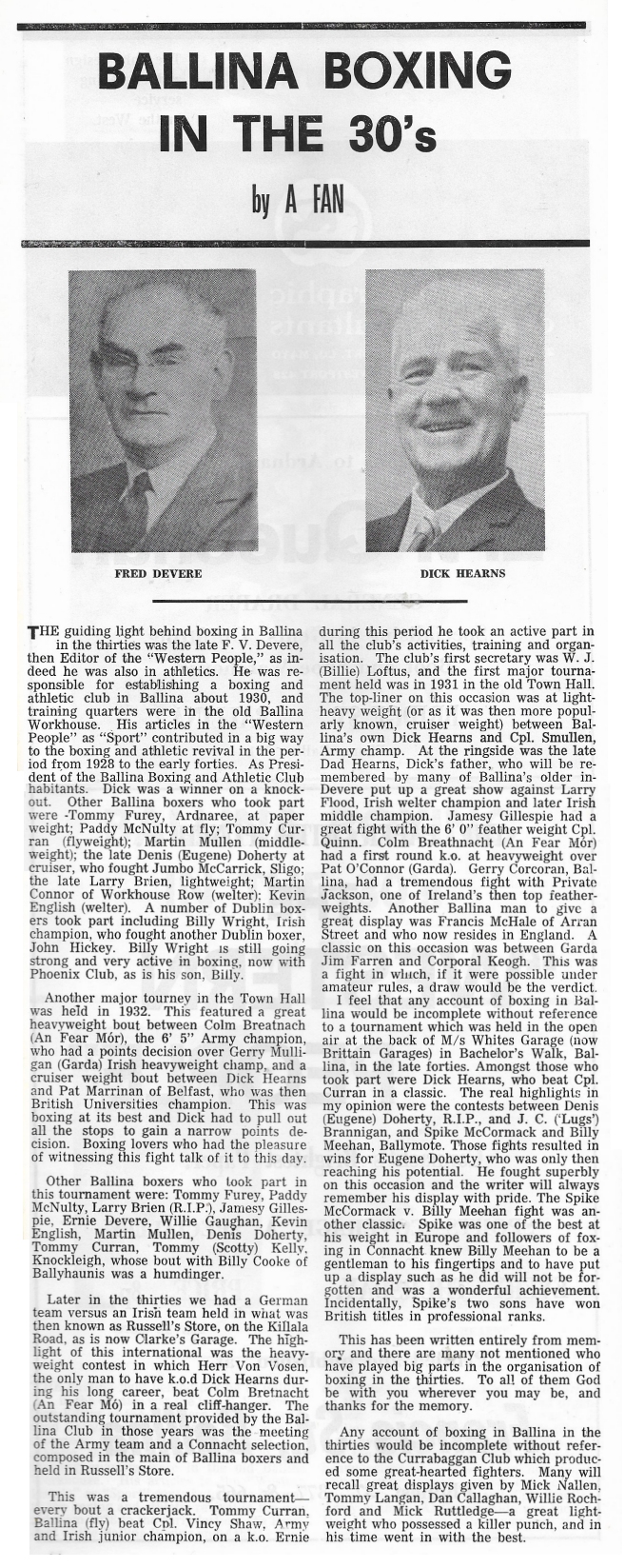 |
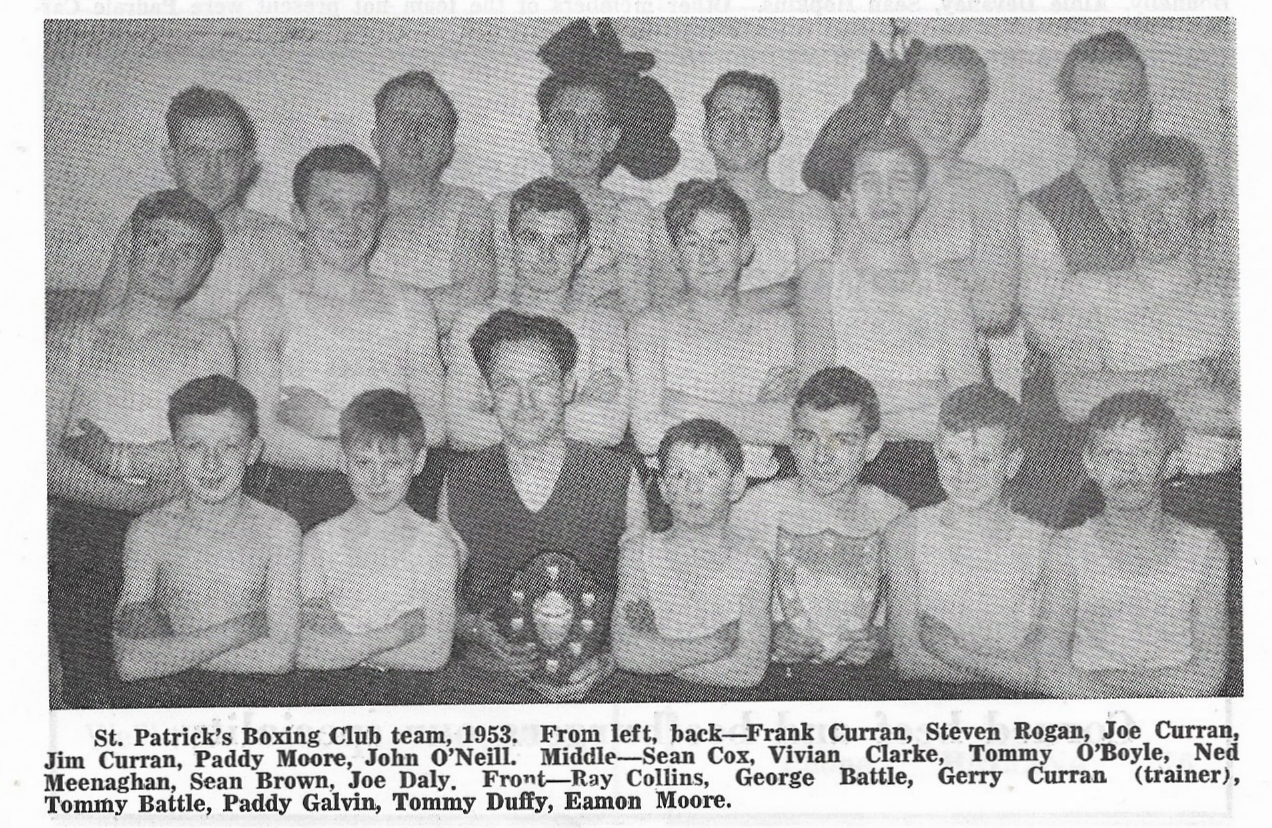 |
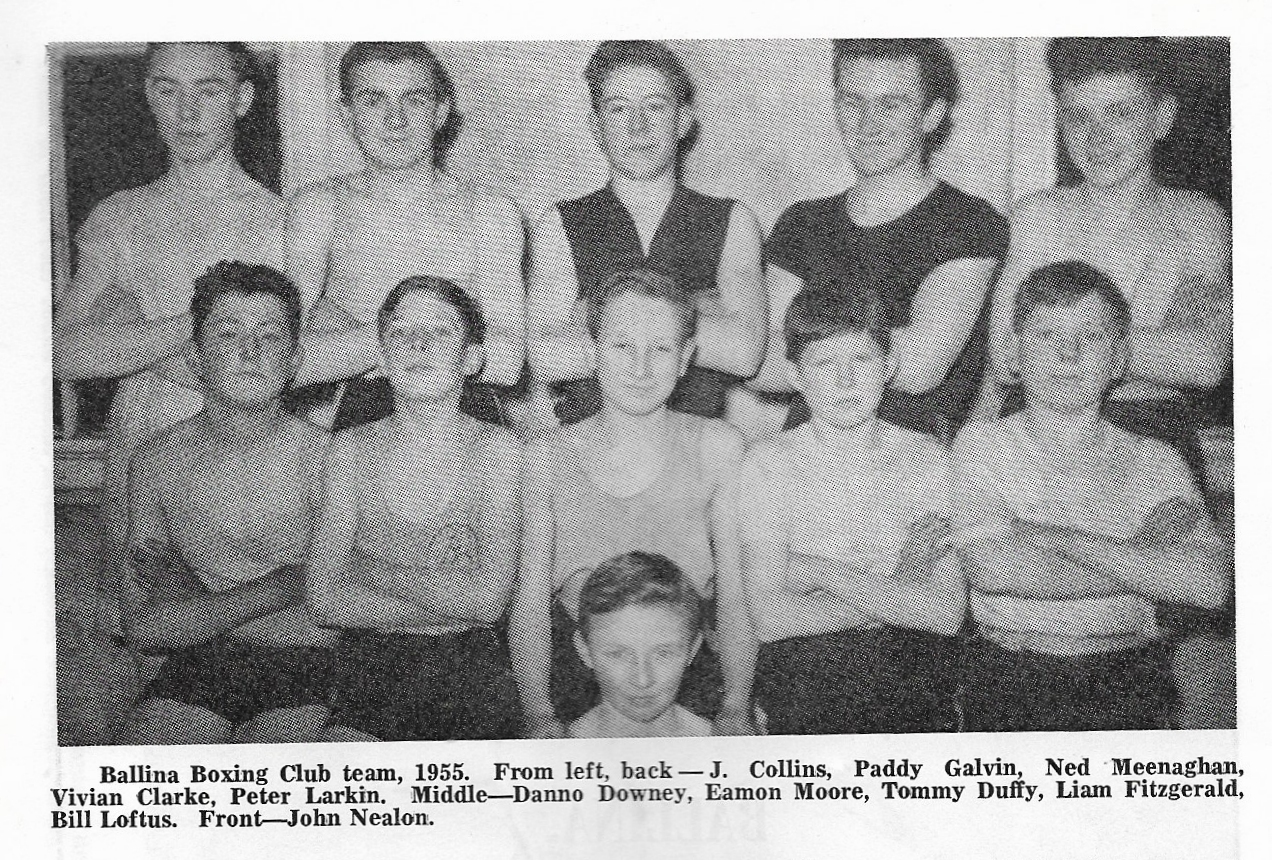 |
Club President, Msgr. Paddy Gallagher, was instrumental in securing the use of the old granary on the Downhill Road as a training venue in 1978, freely given by the late Paddy Murphy of Bunree Mills, and with mentors like Eamonn Horkan who was able and willing to do the needful, Ballina Boxing Club was revitalised and the club continued to train and compete. John O'Boyle too was to the fore at this time in furthering the aims of the club and Joe Lavelle took a keen interest in Ballina BC, and with much success. He used his contacts in England and Wales to organise matches between clubs in those countries to box Ballina selections. Teams travelled to Ballina from St. Pancras BC (London), Bedford, Birmingham, Leeds and Cardiff, and Ballina selections were in turn invited to box in their tournaments overseas. The boxing/dinner shows were staged in Downhill House Hotel to capacity crowds for several seasons from the early 1990s onwards. Joe had honed his skills as a boxer in London, and travelled to Chicago with an Irish Team in 1983.
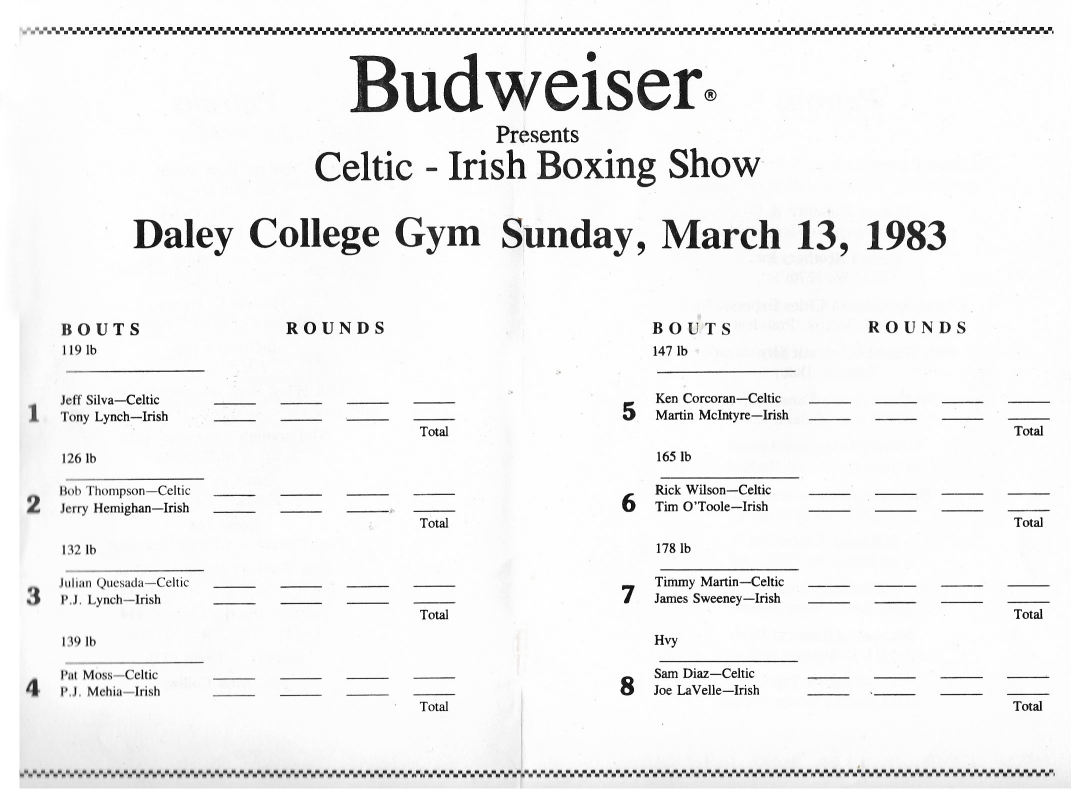 Boxing programme above: P. J. Melia (bout 4) and Joe Lavelle (bout 8) of Ballina Boxing Club boxed in Chicago in 1983 as members of an Irish Boxing Team. Gerry Heneghan (bout 2) of Castlebar Boxing Club (currently coach with Aglish Boxing Club)
was also on the team: both he and Joe won their bouts. The programme
featured American boxers from Davis Square Boxing Club, C.Y.O and Silva
Boxing Club, Harrison Park. |
During this period the club thrived and coaches such as Brian O'Donnell, Gerry Hickey, Liam Collins, Joe McGarry and P. J. Melia together with Joe Lavelle ensured the boxers got the best of training. Though Ballina Boxing Club trained at different venues in the town over the years, benefactor Paddy Murphy (deceased) of Bunree Mills ensured the club had a base on the Sligo Road for many years, and later in donating a smaller building at Pawn Office Lane to the club in 1990 as an exchange. State funding to develop this facility was sought but responses did not meet expectations. In any case, AIBA rules for the dimensions of a competition ring specified that the platform dimensions be a square of side 7.80 metres with the area between the ropes being 6.10 metres on each side: the building on Pawn Office Lane was just 6.50 metres wide in total. As time went on and essential major repairs to the building without grant aid at the time was not be deemed to be money well spent, the club moved to Ardnaree GAA HQ for a season before setting up temporary base in the Ballina Stephenites Sports Centre. In 2012, the club signed a 10-year lease on premises on Mercy Road close to the site of the former Old Workhouse and the club would like to acknowledge the support of IABA (Irish Athletic Boxing Association) and Junior Minister for Sport, Mr. Michael Ring T.D. for this venture. A search for a permanent residence for the club continued, and in 2016 a lease on a site with planning permission to build a boxing arena at Abbeyhalfquarter, Ballina, (granted June 2015) was signed. Major efforts were made to secure state-assisted funding for the construction stage, but, as planning permission was about to expire in June of 2020, the company took the bold step to go on-site, backed mainly through interest-free loans, donations and free labour. The site at Pawn Office Lane is on the market and proceeds from its sale will be used to repay loans. After the main open-plan two-storey structure was complete, Ballina Boxing Club secured a Sports Capital Grant to aid outfitting the ground floor to serve as a gym for the club: this is currently underway, (April 2023) and should be ready for the new boxing season.
The club hosted a number of International Tournaments over the years, more recently with a Finland/Ireland Senior Ladies International in April of 2015. A very successful Polish Training Camp was facilitated in December 2015 which led to an invitation to participate in the Kielce Box Cup, Poland subsequently. Club boxers have been on tours to America, Spain, Italy, England and Scotland after Ireland opened up following the lifting of the restrictions of the pandemic. The club has facilitated an Ireland/England male/female Training Camp in Ballina from 3rd-7th April 2023, ending with a tournament on Good Friday. The club has enjoyed much success at all competitive levels over many years (six Connacht champions in 2022/2023 season) and this is due to the prevailing inclusive ethos in the club which is enjoyed by each and every member, without distinction being made between class, creed, colour or nationality. A caring, professional team is in place to ensure those who wish to join the club are welcomed and well treated in a manner akin to being family members, and all IABA membership requirements are met.